
Palifren Long
Ask a doctor about a prescription for Palifren Long

How to use Palifren Long
Leaflet accompanying the packaging: information for the user
Palifren Long, 25 mg, prolonged-release suspension for injection
In a pre-filled syringe
Palifren Long, 50 mg, prolonged-release suspension for injection in a pre-filled syringe
Palifren Long, 75 mg, prolonged-release suspension for injection in a pre-filled syringe
Palifren Long, 100 mg, prolonged-release suspension for injection in a pre-filled syringe
Palifren Long, 150 mg, prolonged-release suspension for injection in a pre-filled syringe
Palifren Long, 100 mg / 150 mg, prolonged-release suspension for injection in a pre-filled syringe: starter pack
Paliperidone
You should carefully read the contents of this leaflet before using the medicine, as it contains important information for the patient.
- You should keep this leaflet, so you can read it again if you need to.
- If you have any doubts, you should consult a doctor, pharmacist, or nurse.
- If the patient experiences any side effects, including any side effects not listed in this leaflet, they should tell their doctor, pharmacist, or nurse. See section 4.
Table of contents of the leaflet
- 1. What is Palifren Long and what is it used for
- 2. Important information before using Palifren Long
- 3. How to use Palifren Long
- 4. Possible side effects
- 5. How to store Palifren Long
- 6. Contents of the packaging and other information
1. What is Palifren Long and what is it used for
Palifren Long contains the active substance paliperidone, which belongs to a group of antipsychotic medicines, and is used to treat schizophrenia in stable adult patients who have been previously treated with paliperidone or risperidone.
For patients who have previously responded to oral paliperidone or risperidone and have mild to moderate psychotic symptoms, the doctor may use Palifren Long without prior stabilization with paliperidone or risperidone.
Schizophrenia is a disease with "positive" and "negative" symptoms. Positive symptoms mean the accumulation of symptoms that usually do not occur. A person with schizophrenia may, for example, hear voices or see things that do not exist (these are hallucinations), believe in untrue things (these are delusions), or be overly suspicious of others. Negative symptoms mean the lack of normally occurring behaviors or feelings. A person with schizophrenia may, for example, seem withdrawn, closed off, and not respond emotionally at all or may have difficulty speaking clearly and logically. People with this disease may also experience depression, anxiety, guilt, or tension.
Palifren Long helps to alleviate the symptoms of the disease and prevent their recurrence.
2. Important information before using Palifren Long
When not to use Palifren Long
- If the patient is allergic to paliperidone or any of the other ingredients of this medicine (listed in section 6).
- If the patient is allergic to another antipsychotic medicine, including the substance risperidone.
Warnings and precautions
Before starting to use Palifren Long, you should discuss it with your doctor, pharmacist, or nurse.
It has not been studied in elderly patients with dementia. However, in such patients treated with other similar medicines, there may be an increased risk of stroke or death (see section 4 "Possible side effects").
All medicines can cause side effects. Some side effects of this medicine may worsen the symptoms of other medical conditions. Therefore, during treatment with this medicine, you should discuss with your doctor each of the following conditions:
- if the patient has Parkinson's disease
- if the patient has ever been diagnosed with a condition whose symptoms include high fever and muscle stiffness (also known as malignant neuroleptic syndrome)
- if the patient has ever had abnormal movements of the tongue or facial muscles (tardive dyskinesia)
- if the patient has had a low white blood cell count in the past (which may or may not have been caused by the action of other medicines)
- if the patient has diabetes or is prone to it
- if the patient has breast cancer or a pituitary tumor
- if the patient has heart disease or is being treated for heart disease that predisposes to hypotension
- if the patient has low blood pressure when changing position to standing or sitting
- if the patient has epilepsy
- if the patient has kidney function disorders
- if the patient has liver function disorders
- if the patient experiences prolonged or painful erections
- if the patient has a problem with body temperature regulation or overheating
- if the patient has an abnormal, elevated level of the hormone prolactin in the blood or a suspected prolactin-dependent tumor
- if the patient or their family members have had cases of blood clots in blood vessels, as antipsychotic medicines are associated with their formation.
If the patient meets any of the above criteria, they should consult a doctor who may adjust the dose or periodically monitor the patient.
The doctor may order a white blood cell count test, as very rarely, patients taking this medicine have had a dangerously low number of a certain type of white blood cell necessary for fighting infections.
Even if the patient has previously tolerated oral paliperidone or risperidone, rare allergic reactions may occur after Palifren Long injections. Medical help should be sought immediately if the patient experiences a rash, throat swelling, itching, or difficulty breathing, as these may be symptoms of a severe allergic reaction.
This medicine may cause weight gain. Significant weight gain can have a negative impact on the patient's health. The doctor will regularly check the patient's weight.
The doctor will check if the patient has symptoms of high blood sugar, as patients taking this medicine have had new cases of diabetes or worsening of pre-existing diabetes. In patients with pre-existing diabetes, blood glucose levels should be regularly checked.
Because this medicine can suppress vomiting, it may mask the body's normal response to swallowing toxic substances or other medical conditions.
During cataract surgery, the pupil may not dilate sufficiently.
The iris may also be flaccid during the procedure, which can result in eye damage.
If the patient is scheduled for eye surgery, they should tell their ophthalmologist about taking this medicine.
Children and adolescents
This medicine is not used in people under 18 years of age.
Palifren Long and other medicines
The patient should tell their doctor about all medicines they are currently taking or have recently taken, as well as any medicines they plan to take.
Taking this medicine with carbamazepine (a medicine with anticonvulsant and mood-stabilizing effects) may require a change in the dose of this medicine.
Due to the fact that this medicine acts primarily in the brain, interactions with other medicines, such as other psychotropic medicines, opioids, antihistamines, and sedatives that act in the brain, may intensify side effects, such as drowsiness, or other effects on the brain.
This medicine may cause a decrease in blood pressure, so caution should be exercised when taking this medicine with other medicines that lower blood pressure.
This medicine may weaken the effect of medicines used in Parkinson's disease and restless legs syndrome (e.g., levodopa).
This medicine may cause electrocardiogram (ECG) abnormalities, characterized by a prolongation of the time it takes for the electrical impulse to pass through a certain part of the heart (known as "QT interval prolongation"). Other medicines with this effect include medicines used to regulate heart rhythm or treat infections, as well as other antipsychotic medicines.
If the patient has a tendency to seizures, this medicine may increase the risk of their occurrence. Other medicines with this effect include certain medicines used to treat depression or infections, as well as other antipsychotic medicines.
Caution should be exercised when taking Palifren Long with medicines that increase the activity of the central nervous system (psychostimulant medicines such as methylphenidate).
Palifren Long with alcohol
Alcohol should be avoided.
Pregnancy and breastfeeding
If the patient is pregnant or breastfeeding, thinks they may be pregnant, or plans to have a child, they should consult their doctor or pharmacist before using this medicine.
This medicine should not be used during pregnancy, unless it has been discussed with the doctor.
In newborns whose mothers took paliperidone in the last trimester (last 3 months of pregnancy), the following symptoms may occur: trembling, muscle stiffness, and/or weakness, drowsiness, agitation, difficulty breathing, and difficulty feeding. If such symptoms are observed in the patient's child, they should contact their doctor.
This medicine may pass from the mother's body into her breast milk and harm the baby.
Therefore, during treatment with this medicine, breastfeeding should not be done.
Driving and operating machinery
During treatment with this medicine, dizziness, extreme fatigue, and vision disturbances (see section 4) may occur. This should be taken into account in situations where full alertness is required, e.g., when driving a vehicle or operating machinery.
Palifren Long contains sodium
This medicine contains less than 1 mmol of sodium (23 mg) per dose, which means the medicine is considered "sodium-free".
3. How to use Palifren Long
The medicine is administered by a doctor or other medical staff. The doctor will inform the patient when the next injection is needed. It is essential not to miss a scheduled dose. If it is not possible to keep the scheduled appointment, the doctor should be informed immediately to schedule another appointment as soon as possible.
The first (150 mg) and second (100 mg) injections of this medicine will be administered into the upper arm with an approximate 1-week interval. Subsequent injections (in a dose range of 25 mg to 150 mg) will be administered into the upper arm or buttock once a month.
If the doctor decides to switch from using long-acting risperidone injections to this medicine, the first injection of this medicine (in a dose range of 25 mg to 150 mg) will be administered into the upper arm or buttock on the day of the next scheduled injection. Subsequent injections (in a dose range of 25 mg to 150 mg) will be administered into the upper arm or buttock once a month.
Depending on the symptoms occurring in the patient, the doctor may increase or decrease the administered dose of the medicine by one level during the scheduled monthly injection.
Patient with renal impairment
The doctor will adjust the dose of the medicine, taking into account the patient's kidney function. If the patient has mild kidney function disorders, the doctor may reduce the dose. This medicine should not be used in cases of moderate or severe kidney function disorders.
Elderly patients
The doctor may reduce the dose of the medicine if the patient has impaired kidney function.
Using a higher dose of Palifren Long than recommended
This medicine will be administered under medical supervision, so administering too high a dose is unlikely.
In patients who received too high a dose of paliperidone, the following symptoms may occur: drowsiness and sedation, rapid heart rate, low blood pressure, abnormal ECG (electrocardiogram), or slowed or abnormal muscle movements of the face, body, arms, or legs.
Stopping the use of Palifren Long
If the patient stops taking the injections, the medicine will stop working. The use of the medicine should not be stopped unless the doctor decides to do so, as the symptoms of the disease may return.
If there are any further doubts about the use of this medicine, the patient should consult their doctor or pharmacist.
4. Possible side effects
Like all medicines, this medicine can cause side effects, although not everybody gets them.
The patient should immediately inform their doctor if:
- they experience blood clots in the veins, especially in the legs (symptoms include swelling, pain, and redness of the leg), which can move through the blood vessels to the lungs, causing chest pain and difficulty breathing. If such symptoms occur, medical help should be sought immediately.
- they have dementia and experience a sudden change in mental state or sudden weakness or numbness of the face, arms, or legs, especially one-sided, or speech disturbances, even if only for a short time. These symptoms may signal a stroke.
- they experience fever, muscle stiffness, sweating, or decreased level of consciousness (a condition known as malignant neuroleptic syndrome). Immediate treatment may be necessary.
- they experience prolonged or painful erections. This condition is known as "priapism". Immediate treatment may be necessary.
- they experience involuntary rhythmic movements of the tongue, lips, or face. It may be necessary to stop treatment with paliperidone.
- they experience a severe allergic reaction characterized by fever, swelling of the lips, face, tongue, or throat, difficulty breathing, itching, skin rash, and sometimes a drop in blood pressure (known as "anaphylactic reaction"). Even if the patient has previously tolerated risperidone or paliperidone orally, rare allergic reactions may occur after paliperidone injections.
- they are scheduled for eye surgery, they should inform their ophthalmologist about taking this medicine. During cataract surgery, a condition known as "floppy iris syndrome" may occur, which can lead to eye damage.
- they experience a dangerously low number of certain white blood cells necessary for fighting infections. The following side effects may occur:
Very common side effects (may affect more than 1 in 10 people)
- difficulty sleeping or waking up
Common side effects (may affect up to 1 in 10 people)
- cold symptoms, urinary tract infections, flu-like symptoms
- Palifren Long may increase the level of the hormone prolactin in the blood (which may or may not cause symptoms). If symptoms of high prolactin levels occur, they may include in men: breast swelling, difficulty achieving or maintaining an erection, or other sexual disturbances. In women, they may include breast discomfort, milk secretion from the breasts, absence of menstrual periods, or other menstrual cycle disturbances
- high blood sugar, weight gain, weight loss, decreased appetite
- irritability, depression, anxiety
- parkinsonism: this condition may include slow or abnormal movements, a feeling of stiffness or muscle tension (which makes the patient's movements uneven, jerky), and sometimes even a feeling of "freezing" of movements, followed by a release. Other symptoms of parkinsonism include a slow, shuffling gait, tremors at rest, increased saliva production, and a face without expression
- psychomotor agitation, feeling of drowsiness or decreased alertness
- dystonia: this condition includes slow or sustained involuntary muscle contractions. Although it can affect any part of the body (which can result in an abnormal posture), dystonia most commonly affects the facial muscles, including abnormal movements of the eyes, lips, tongue, or jaw
- dizziness
- dyskinesia: this condition includes involuntary muscle movements and may take the form of repetitive, spasmodic, or twisting movements or jerks
- tremors
- headaches
- rapid heart rate
- high blood pressure
- cough, stuffy nose
- abdominal pain, vomiting, nausea, constipation, diarrhea, indigestion, toothache
- increased activity of liver enzymes in the blood
- bone or muscle pain, back pain, joint pain
- absence of menstruation
- galactorrhea
- fever, weakness, fatigue
- reaction at the injection site, including itching, pain, or swelling
Uncommon side effects (may affect up to 1 in 100 people)
- pneumonia, bronchitis, respiratory tract infections, sinusitis, urinary tract infections, ear infections, fungal nail infections, tonsillitis, skin infections
- decreased white blood cell count, decreased number of certain white blood cells that protect against infections, decreased platelet count (blood cells responsible for stopping bleeding), anemia
- allergic reaction
- onset of diabetes and worsening of pre-existing diabetes, increased insulin levels in the blood (hormone that regulates blood sugar levels)
- increased appetite
- loss of appetite leading to malnutrition and low body weight
- high levels of triglycerides (fats) in the blood, increased cholesterol levels in the blood
- sleep disturbances, elevated mood (mania), decreased libido, nervousness, nightmares
- late dyskinesia (involuntary, repetitive, or jerky movements of the face, tongue, or other parts of the body). The patient should immediately inform their doctor if they experience involuntary rhythmic movements of the tongue, lips, or face. It may be necessary to stop treatment with this medicine
- fainting, need to move limbs, dizziness when changing position to standing, concentration disorders, speech difficulties, loss of taste, decreased sensitivity to pain and touch on the skin, feeling of tingling, prickling, or numbness of the skin
- blurred vision, eye infection or conjunctivitis, dry eye
- feeling of dizziness, ringing in the ears, ear pain
- abnormal heart rhythm, abnormal conduction of electrical impulses in the heart, prolongation of the QT interval in the heart, rapid heart rate when changing position to standing, slow heart rate, abnormal electrocardiogram (ECG), feeling of palpitations
- low blood pressure, low blood pressure when changing position to standing
- (which may cause some patients taking this medicine to faint, feel dizzy, or lose consciousness when standing up or getting up)
- shallow breathing, congestion of the respiratory tract, wheezing, sore throat, nosebleeds
- abdominal discomfort, stomach or intestinal infections, difficulty swallowing, dry mouth
- passing gas
- increased activity of the enzyme GGTP (liver enzyme - gamma-glutamyltransferase) in the blood, increased activity of liver enzymes in the blood
- hives, itching, rash, hair loss, eczema, dry skin, redness of the skin, acne
- increased activity of CPK (creatine phosphokinase) in the blood - an enzyme that is sometimes released from damaged muscles
- muscle spasms, joint stiffness, muscle weakness, neck pain
- urinary incontinence, frequent urination, painful urination
- erectile dysfunction, ejaculation disorders, absence of menstruation, and other menstrual cycle disturbances (in women), breast enlargement in men, sexual disturbances, breast pain
- swelling of the face, lips, eyes, or tongue, swelling of the body, arms, or legs
- increased body temperature
- change in gait
- chest pain, chest discomfort, malaise
- skin thickening
- fall
Rare side effects (may affect up to 1 in 1,000 people)
- eye infection
- skin rash caused by mites, subcutaneous abscess
- increased number of eosinophils (a type of white blood cell) in the blood
- abnormal secretion of the hormone that regulates the amount of urine
- sugar in the urine
- life-threatening complications of untreated diabetes
- low blood sugar
- excessive thirst
- lack of movement and reaction to stimuli in a patient who is not sleeping (catatonia)
- disorientation
- sleepwalking (walking while sleeping)
- apathy
- difficulty achieving orgasm
- malignant neuroleptic syndrome (disorientation, decreased consciousness or loss of consciousness, high fever, and severe muscle stiffness), cerebral vascular disorders including sudden cessation of blood flow to the brain (stroke or "mini" stroke), lack of reaction to stimuli, loss of consciousness, low level of consciousness, seizures, balance disorders
- abnormal coordination
- glaucoma (increased pressure in the eyeball)
- eye movement disorders, rotational eye movements, increased sensitivity of the eyes to light, increased tearing, redness of the eyes
- atrial fibrillation (abnormal heart rhythm), irregular heart rhythm
- blood clots in the veins, especially in the legs (symptoms include swelling, pain, and redness of the leg). If such symptoms occur, medical help should be sought immediately
- flushing
- sleep apnea (breathing difficulties during sleep)
- pulmonary congestion
- crackling in the lungs
- pancreatitis, tongue swelling, fecal incontinence, very hard stools
- chapped lips
- skin rash associated with drug use, skin thickening, dandruff
- muscle fiber breakdown and muscle pain (rhabdomyolysis)
- joint swelling
- urinary incontinence
- breast discomfort, breast enlargement, gynecomastia
- vaginal discharge
- very low body temperature, chills, feeling of thirst
- withdrawal symptoms
- abscess at the injection site, deep skin infection, cyst at the injection site, bruising at the injection site
Side effects with unknown frequency (frequency cannot be estimated from the available data)
- dangerously low number of certain white blood cells responsible for fighting infections;
- severe allergic reaction characterized by fever, swelling of the lips, face, tongue, or throat, difficulty breathing, itching, skin rash, and sometimes a drop in blood pressure
- dangerously excessive thirst - water intoxication
- eating disorders associated with sleep
- coma due to uncontrolled diabetes
- head tremors
- blood clot in the lungs causing chest pain and difficulty breathing. If such symptoms occur, medical help should be sought immediately
- decreased oxygenation of various parts of the body (due to decreased blood flow)
- rapid, shallow breathing, aspiration pneumonia, voice disorders
- intestinal obstruction, lack of intestinal peristalsis leading to obstruction
- jaundice (yellowing of the skin and eyes)
- severe or life-threatening rash with blisters and peeling skin, which may appear in the mouth, nose, eyes, and genitals, as well as around these areas and may also spread to other parts of the body (Stevens-Johnson syndrome or toxic epidermal necrolysis)
- severe allergic reaction with swelling, which may include the throat and lead to difficulty breathing
- skin discoloration, peeling, and itching of the scalp or body
- abnormal posture
- in newborns whose mothers took Palifren Long during pregnancy, the following side effects may occur: irritability, slow or sustained muscle contractions, trembling, drowsiness, difficulty breathing, and difficulty feeding
- priapism (prolonged erection, which may require surgical intervention)
- low body temperature
- necrosis at the injection site and ulcer at the injection site
Reporting side effects
If side effects occur, including any side effects not listed in this leaflet, the patient should tell their doctor, pharmacist, or nurse. Side effects can be reported directly to the Department of Drug Safety Monitoring of the Office for Registration of Medicinal Products, Medical Devices, and Biocidal Products
Al. Jerozolimskie 181C
02-222 Warsaw
Phone: +48 22 49 21 301
Fax: +48 22 49 21 309
Website: https://smz.ezdrowie.gov.pl
Side effects can also be reported to the marketing authorization holder.
Reporting side effects will help gather more information on the safety of the medicine.
5. How to store Palifren Long
The medicine should be stored out of sight and reach of children.
Do not use this medicine after the expiry date stated on the packaging. The expiry date refers to the last day of the month.
Do not store above 30°C.
Medicines should not be disposed of via wastewater or household waste. The patient should ask their pharmacist how to dispose of medicines that are no longer needed. This will help protect the environment.
6. Contents of the packaging and other information
What Palifren Long contains
The active substance of the medicine is paliperidone.
Each pre-filled syringe of Palifren Long 25 mg contains 39 mg of paliperidone palmitate, which corresponds to 25 mg of paliperidone.
Each pre-filled syringe of Palifren Long 50 mg contains 78 mg of paliperidone palmitate, which corresponds to 50 mg of paliperidone.
Each pre-filled syringe of Palifren Long 75 mg contains 117 mg of paliperidone palmitate, which corresponds to 75 mg of paliperidone.
Each pre-filled syringe of Palifren Long 100 mg contains 156 mg of paliperidone palmitate, which corresponds to 100 mg of paliperidone.
Each pre-filled syringe of Palifren Long 150 mg contains 234 mg of paliperidone palmitate, which corresponds to 150 mg of paliperidone.
The other ingredients are: polysorbate 20, macrogol 4000, citric acid monohydrate, disodium phosphate, sodium dihydrogen phosphate monohydrate, sodium hydroxide (to adjust pH), water for injections
What Palifren Long looks like and contents of the packaging
Palifren Long is a white or off-white (broken white) prolonged-release suspension for injection in a pre-filled syringe.
Each packaging contains: 1 pre-filled syringe and 2 needles.
Starter pack:
Each packaging contains 1 pre-filled syringe containing 150 mg of paliperidone and 2 needles, as well as 1 pre-filled syringe containing 100 mg of paliperidone and 2 needles.
Not all pack sizes may be marketed.
Marketing authorization holder
Adamed Pharma S.A.
Pieńków, ul. M. Adamkiewicza 6A
05-152 Czosnów
phone: +48 22 732 77 00
Manufacturer
Adamed Pharma S.A.
ul. Marszałka Józefa Piłsudskiego 5
95-200 Pabianice
Pharmathen International S.A.
Industrial Park Sapes
Rodopi Prefecture, Block No 5
69300 Rodopi
Greece
Pharmathen S.A.
Dervenakion 6
15351 Pallini Attiki
Greece
This medicine is authorized in the Member States of the European Economic Area under the following names:
Austria: Palibon
Croatia: Arion
Cyprus: Psokardon
Denmark: Psokardon
Greece: Psokardon
Luxembourg: Psokardon
Portugal: Psokardon
Date of last revision of the leaflet: 07.2024
Information intended for healthcare professionals only or healthcare workers and should be read together with the full product information (Summary of Product Characteristics).
The suspension for injection is intended for single use only. Before administration, the suspension should be inspected for foreign particles. If foreign particles are visible in the pre-filled syringe, the medicinal product should not be used.
The packaging contains a pre-filled syringe and 2 needles with a safety device [22G 1.5 inch (38.1 mm x 0.72 mm) and 23G 1 inch (25.4 mm x 0.64 mm)] for intramuscular injection. The medicinal product Palifren Long is also available in a starter pack containing two pre-filled syringes (150 mg + 100 mg) and 2 additional needles with a safety device.

- (A) 22 G x 1.5 inch (gray nozzle)
- (B) 23 G x 1 inch (blue nozzle)
- (C) Pre-filled syringe
- (D) Nozzle
- (E) Tip cap
- 1. Shake the pre-filled syringe vigorously for at least 10 seconds to ensure the suspension is homogeneous.
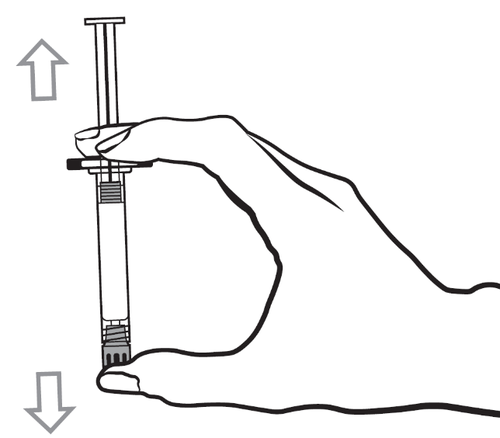
- 2. Choose the appropriate needle.
The first, starting dose of Palifren Long (150 mg) should be administered on
- day 1 of treatment into the DELTOID MUSCLE using the DELTOID MUSCLE needle. The second starting dose of Palifren Long (100 mg) should be administered 1 week later (day 8) into the DELTOID MUSCLE using the DELTOID MUSCLE needle.
In case of a switch from risperidone long-acting injections to Palifren Long, the first injection of Palifren Long (in a dose range of 25 mg to 150 mg) can be administered on the day of the next scheduled injection into the DELTOID MUSCLE or GLUTEAL MUSCLE using the appropriate needle. Subsequent maintenance doses can be administered into the DELTOID MUSCLE or GLUTEAL MUSCLE using the appropriate needle once a month.
For injections into the DELTOID MUSCLE in patients weighing <90 kg, the 1-inch, 23g (25.4 mm x 0.64 mm) needle (with a blue nozzle) should be used. if patient weighs ≥90 1.5-inch, 22g (38.1 0.72 gray used.
For injections into the GLUTEAL MUSCLE, the 1.5-inch, 22G (38.1 mm x 0.72 mm) needle (with a gray nozzle) should be used.
- 3. Holding the pre-filled syringe vertically upwards, remove the rubber tip cap by twisting it.
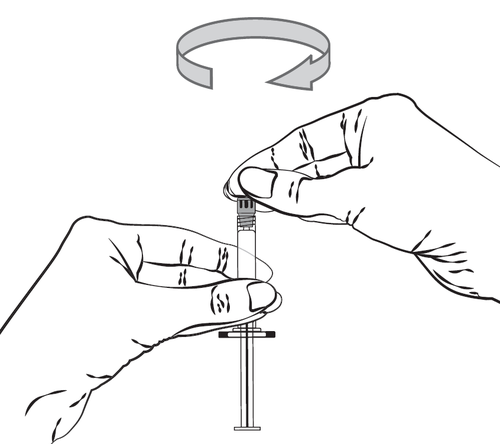
- 4. Tear off the outer part of the needle packaging halfway. Hold the needle shield by the plastic packaging. Connect the Luer-type needle hub to the pre-filled syringe by a gentle twisting motion in the direction of the arrow.
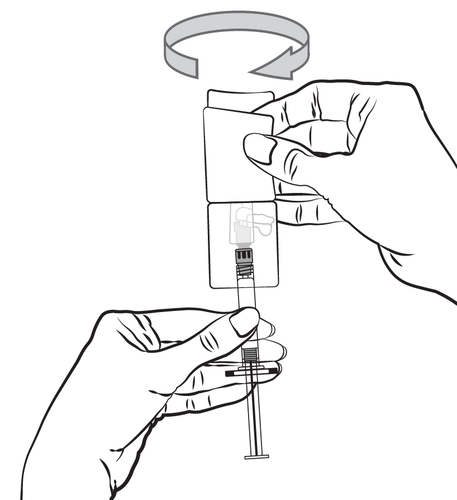
- 5. Remove the needle shield by a straight pull. Do not twist the needle shield, as this may cause the needle to loosen from the pre-filled syringe.
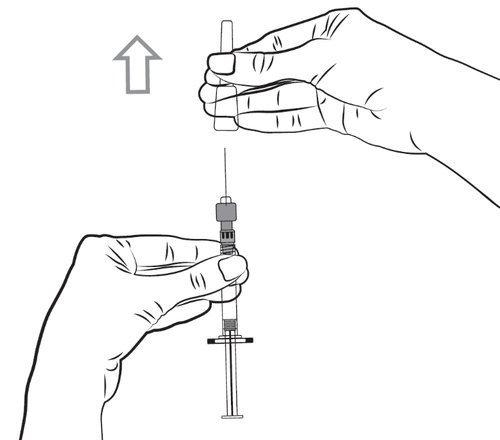
- 6. Remove the air from the pre-filled syringe by gently pressing the plunger rod while holding the pre-filled syringe in an upright position.
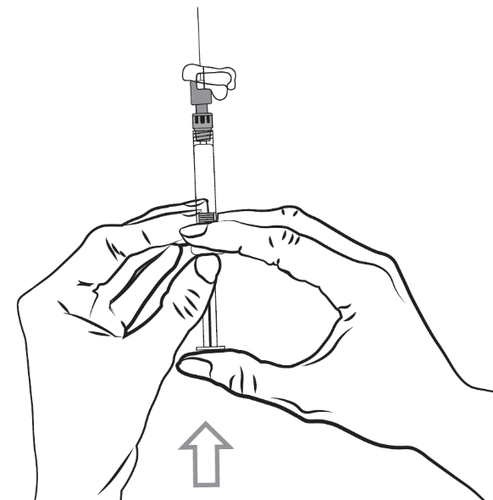
- 7. Administer the entire contents of the pre-filled syringe intramuscularly, slowly, and deeply into the selected muscle of the patient — deltoideus or gluteus. Do not administer the medicinal product intravenously or subcutaneously.
- 8. After completing the injection, shield the needle by using the thumb or finger of one hand (8a, 8b) or a flat surface (8c). The click sound confirms that the needle is properly shielded. Dispose of the pre-filled syringe with the needle in an appropriate manner.
8a
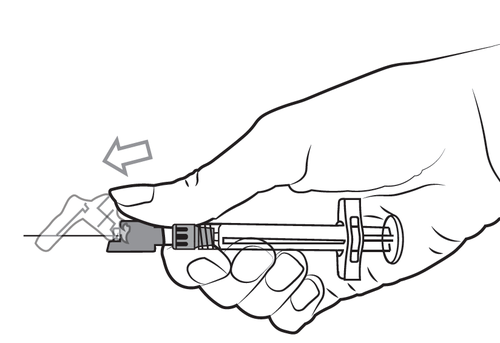
8b
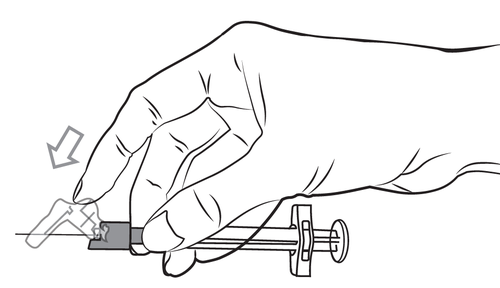
8c
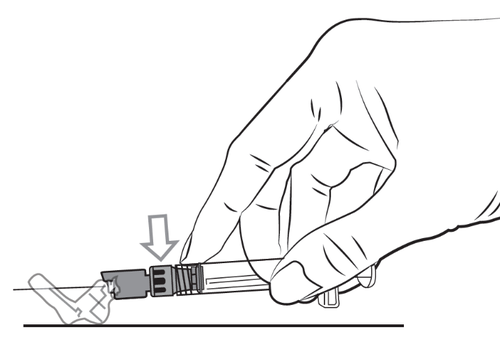
- Country of registration
- Active substance
- Prescription requiredYes
- ImporterAdamed Pharma S.A. BELUPO lijekovi i kozmetika, d.d. Pharmathen International S.A. Pharmathen S.A.
- This information is for reference only and does not constitute medical advice. Always consult a licensed doctor before taking any medication. Oladoctor is not responsible for medical decisions based on this content.
- Alternatives to Palifren LongDosage form: Suspension, 25 mgActive substance: paliperidoneManufacturer: Pharmathen International S.A. Pharmathen S.A.Prescription requiredDosage form: Suspension, 50 mgActive substance: paliperidoneManufacturer: Pharmaten International S.A. Pharmaten S.A.Prescription requiredDosage form: Suspension, 75 mgActive substance: paliperidoneManufacturer: Pharmaten International S.A. Pharmaten S.A.Prescription required
Alternatives to Palifren Long in other countries
The best alternatives with the same active ingredient and therapeutic effect.
Alternative to Palifren Long in Spain
Alternative to Palifren Long in Ukraine
Online doctors for Palifren Long
Discuss dosage, side effects, interactions, contraindications, and prescription renewal for Palifren Long – subject to medical assessment and local rules.









